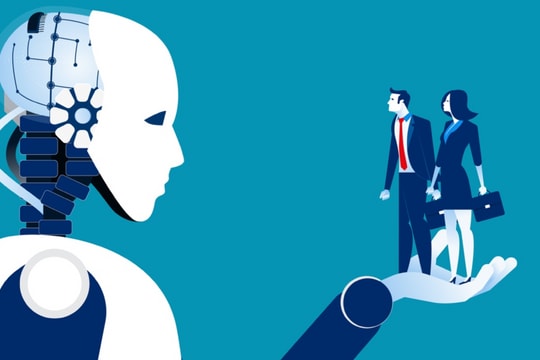How dependent is China on US artificial intelligence technology?
Artificial intelligence (AI) is shaping the future of the world, with China and the United States leading the race. However, China is still heavily dependent on AI technologies developed by the United States.
Reuters news agency recently reported that the Biden administration is planning to impose strict regulations on US-developed AI models like ChatGPT to protect this technology from falling into the hands of countries like China and Russia.

However, over the past year the Chinese government has been building its own domestic AI industry and asking domestic companies to avoid using foreign technology.
Does China have easy access to advanced US AI models?
Major AI models developed by US artificial intelligence company OpenAI, such as ChatGPT and the image generation tool DALL-E, have not been officially deployed in mainland China. Accordingly, an OpenAI spokesperson said that the company has not been able to deploy these AI models in some countries, including China, due to strict regulations from governments.
Although OpenAI has not released details on the specific reasons why it cannot deploy AI services in China, many analysts believe that the reason may be due to the Chinese government's strict regulations on the use and development of AI technology or concerns about cybersecurity.
However, a large number of Chinese companies and engineers accessed OpenAI's services using proxy server tools such as virtual private networks (VPNs) to mask their network addresses.
As a result, many Chinese companies have been able to build software and applications on top of OpenAI's models. Chinese companies also regularly benchmark their own AI models against OpenAI's.
In response, OpenAI has blocked Chinese companies from accessing its services. Last December, OpenAI suspended the account of TikTok parent company ByteDance after tech site The Verge reported that ByteDance had used OpenAI's technology to develop its own AI.
In Hong Kong, a special administrative region of China, access to OpenAI AI models is also limited but not completely blocked. While OpenAI services are not available there, Microsoft, an OpenAI investor and partner, has announced Copilot, a next-generation AI service built on OpenAI’s latest technology. By partnering with Microsoft, companies in Hong Kong can also access OpenAI AI models.
Is China fully autonomous in developing AI technology?
The Commerce Department is targeting export controls on proprietary or closed-source AI models, where the software and training data are kept secret, sources told Reuters. Open-source models would be outside the scope of export controls.
However, China is relying heavily on open-source models developed in the West, such as “Llama” – a large language model (LLM) developed by Meta AI, a research lab under Meta Platforms (Facebook’s parent company).
In March, the Beijing Institute of Artificial Intelligence, a high-end research lab, was quoted by Chinese state media as saying that the majority of AI models produced in China are actually built on Meta AI's Llama models, and that this is a key challenge for China's AI development.
The Beijing Institute of Artificial Intelligence reported to Chinese Premier Li Qiang at the time that China was “seriously lacking in autonomy” in this field.
In November 2023, 01.AI, one of China's most famous AI unicorns founded by former Google executive Lee Kai-fu, faced a wave of backlash after some AI engineers discovered that their Yi-34B AI model was built on Meta AI's Llama system.
However, a number of Chinese tech companies such as Baidu, Huawei, and iFlytek are working on developing their own “completely proprietary” AI models, with some even claiming that their AI models can compete with OpenAI’s latest GPT-4 model in some areas.
How does China relate to US AI models?
With the goal of ensuring national security and promoting the independent development of AI technology, the Chinese government is focusing on building AI models that it can actively control, independent of foreign countries.
China Daily, a state-backed newspaper, said in a post on China's Weibo social media platform last February that ChatGPT “could assist the US government in spreading disinformation and manipulating global narratives for its own geopolitical gain.”
China has also proactively issued regulations on the use of generative AI, requiring services to be approved by the government before being released to the public. As of January, China had approved more than 40 AI models for public use, none of which were foreign.
Last April, a senior Hong Kong government official also said that the city had no plans to allow the use of ChatGPT in local government.
Instead of promoting US AI technology, the Chinese government focuses on comparing its own AI development level with the US, thereby identifying weaknesses that need to be improved to narrow the gap.






